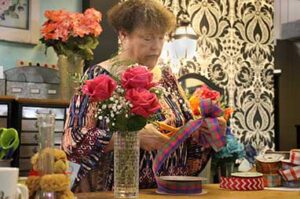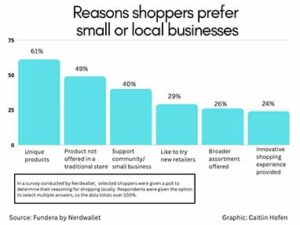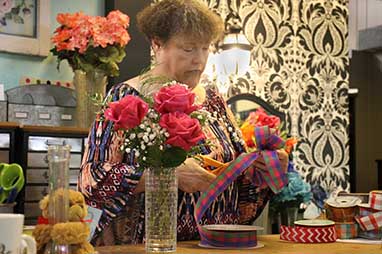By Caitlin Hofen, Feature Editor
Ahead of Small Business Saturday, local shop owners say stores are vital
The rising sun warms the brick storefronts as people anxiously wait around “The Square” in downtown Alva. In the distance, the Northwestern clock tower chimes seven times. Business owners unlock and open doors, welcoming customers to browse their great deals. Shoppers scamper from store to store, hoping to beat the July heat.
This is the scene during Alva’s annual Crazy Days sale, a town-wide event promoting local shopping each summer. Money spent during events like Crazy Days cycles back into Alva’s local economy. And as America is about a week away from Small Business Saturday, a nationwide holiday raising awareness for hometown businesses, business owners say the importance and impact of shopping locally affects almost every aspect of communities.

“People need to realize it’s the small businesses who sponsor things like sports teams and provide support for local events,” said Kim Foster, co-owner of Schuhmacher’s Copper Penny. “We get asked to give donations to almost everything. We give as much back, if not more, to Alva.”
Foster and her daughter Natasha own and operate the Copper Penny, a gift store and floral shop. Since opening in 2013, the Copper Penny has expanded to the adjoining shop space and has grown its services.
“We play a pretty big role in the economy in Alva,” Foster said. “We offer everything from home décor to cooking utensils and more. When we saw a need in the community, we bought out a retiring florist.”
The U.S. Small Business Administration reported in 2016 that 52.4% of Oklahoma’s private workforce is employed by small, locally owned businesses. Despite the prevalence of small businesses, their owners say people don’t always use the personal services they offer.

“I wish people would see we are a business that is active and vital,” Foster said. “We can provide customers with the same quality merchandise found at big box stores — only we wrap it for you, deliver it for you, and we help you pick it out. You’re not just wandering around in a big store by yourself. We help you with your shopping experience by offering suggestions and explaining our merchandise.”
Like the Copper Penny, 174 businesses in Alva are members of the Alva Chamber of Commerce. Chamber Director Jodie Bradford-Stevison said local shopping leaves a lasting impact on buyers and sellers alike.
“I think the most important aspect of shopping local is the relationships made with the business owners,” Bradford-Stevison said. “Customers can go in looking for something specific, and the small business owners are going to help find exactly what is needed while getting to you.”
‘WE FILL A NEED’
Owned by Jason and Melanie Gaisford, G & G Home Furnishings is another small business that relies on local shopping.
“With us being the only furniture store in this area, we fill a need that isn’t provided for anywhere else in our community,” Jason Gaisford said. “Without local shopping, we probably wouldn’t exist. In a rural setting, it takes everybody to serve each business.”
From a financial standpoint, small businesses have the biggest impact on local economies.
“If we want Alva to be the best it can be, we need to support our local retailers and businesses,” Gaisford said. “Without the sales taxes generated from those businesses, our city doesn’t function.”
The money spent at a local business doesn’t stop there.

“Let’s say you buy from a mom and pop [shop], and that mom and pop go somewhere in the community and spend money,” Gaisford said. “That money goes back into our local economy. Plus, they are paying their employees who live and work here to also go spend money in the community.”
Keep It Local OK, an organization promoting small businesses across the Sooner State, reports that 68% of money spent at local businesses stays in the local economy, according to an article on the organization’s website. In contrast, only 43% stays local when shopping at a corporate chain.
“If you buy goods online, that money doesn’t come back into our community and maybe not even the sales tax,” Gaisford said. “It’s the same concept when shopping out of town because the money doesn’t come back here. Therefore, the community isn’t being made better. People need to realize if they want their community to be better, they have to support their community.”
Shopping events throughout the year help encourage consumers to buy locally.
“Crazy Days is a big day for many of our businesses,” Bradford-Stevison said. “It gives the business owners the chance to mark down their summer inventory and make room for new merchandise. Small Business Saturday is another important event. I think more people are apt to go out and support small businesses because they want to see them grow and be successful during the holiday season.”
Many stores see the most traffic around the holidays as shoppers look to deck the halls and shop ‘til they drop.

“For our business, the best time of year is the third quarter,” Foster said. “This is the end of the calendar year, from October to December. It’s our best time because people like to decorate their home for the holidays, so we provide a unique opportunity for them to see decor [that is] not mass-produced.”
Besides exclusive merchandise, the pricing of products sold in small businesses is comparable to that of large corporations.
“We pride ourselves on being competitive,” Gaisford said. “We watch what bigger stores are doing on a regular basis and look online to see what the online prices are. I believe everyone will find our prices are competitive with those. If someone finds a better deal somewhere else, we’d be willing to look at it and maybe even beat it.”
LOCAL SHOPPING GROWS
In light of the COVID-19 pandemic, shopping locally has expanded, with many businesses creating an online presence to reach new customers and fulfill the needs of existing ones.
“Many stores around town were offering curbside pickup and relied on customers to look online to browse their merchandise,” Bradford-Stevison said. “You could shop in your pajamas and pick it up the same day. You can call many stores, and they will help you find what you’re looking for over the phone. I think COVID-19 opened a lot of avenues for local shopping without actually stepping foot in a store.”
According to a survey by Intuit MintLife, 70% of consumers have supported local businesses by shopping online only or by using a mix of online and in-store shopping since the start of the pandemic.
“First and foremost, COVID-19 caused us to make some changes,” Gaisford said. “One of the things we did almost immediately was buy more product. With so many shutdowns, our fear was not being able to get products. This move paid huge dividends for us. People weren’t traveling as much, so they stayed at home to do their shopping, which we benefited from.”
Finding new ways to serve customers allowed many local businesses to survive during the pandemic. Their impact on local economies and the support they give affects communities in more ways than one.
“I know the businesses we attend chamber meetings with and consider our friends support Alva wholeheartedly,” Foster said. “Without that support, I don’t know who would be donating to sponsor yearbook pages or supporting the sports teams. When you shop local, you aren’t just supporting a small business. You’re supporting your community.”

